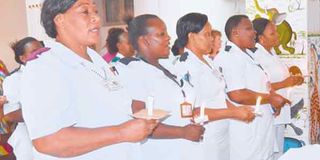More teachers needed at public health schools

What you need to know:
- This will enable training institutions to meet health care requirements set by the Ministry of Health, Community Development, Gender, Elderly and Children. Many public health training institutions in the country have a shortage of teachers.
Mwanza. The government has been advised to employ enough teachers at public nursing and midwifery colleges.
This will enable training institutions to meet health care requirements set by the Ministry of Health, Community Development, Gender, Elderly and Children. Many public health training institutions in the country have a shortage of teachers.
This was said last week by nursing training assistant director Ndemetria Vermand. “Privately owned nursing and midwifery colleges face challenges, but not at the same level as the public ones,” he said.
The move, according to Mr Ndemetria, will help provide high quality training to nurses, midwives and improve health care in the country.
He was speaking at a ceremony to award certificates and trophies to three USAID-supported nursing and midwifery colleges in Kagera and Mara regions.
The colleges are Shirati in Rorya District, Kisare in Serengeti District (both in Mara Region) and Murgwanza in Ngara District, Kagera Region, which excelled in continuous quality improvement (CQI) and achieved outstanding performance in health improvement. CQI was implemented by a non-governmental health organisation, Jhpiego, together with the government across 10 nursing colleges in the Lake Zone. “Jhpiego has been providing support and training to health institutions across the country through a maternal and child survival programme,” said country programme director John George.
He said it was important for health training institutions to produce competent health workers in the country.
He commended the government for prioritising reproductive, maternal, newborn and child health and by outlining a new approach to end preventable deaths of women, new-born and children.
Nursing training coordinator Molland Mkamba said there were 161 nursing training facilities in the country and 77 of them public ones.



